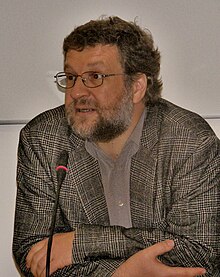Rein Raud
| Rein Raud | |
|---|---|
 |
|
| Born |
December 21, 1961 Tallinn, Estonia |
|
Main interests
|
Cultural theory · Japanese culture · Asian Philosophy |
|
Influences
|
|
Rein Raud is an Estonian scholar and author.
He was born in 1961 in the family of Eno Raud and Aino Pervik, both children's authors. He is the eldest of three children. His younger brother Mihkel Raud is a playwright, television personality, singer, guitarist, journalist and member of the Estonian Parliament; his sister Piret Raud is an artist. He is the grandson of playwright, poet and writer Mart Raud.
He graduated from the Leningrad State University (now called Saint Petersburg State University) in 1985 in Japanese Studies and earned a PhD degree in Literary Theory at the University of Helsinki in 1994. Raud has worked in the Estonian Institute of Humanities (now a part of Tallinn University) and the University of Helsinki, where he is currently a professor in the Department of World Cultures. From 2006 to 2011 Raud served as the first rector of the Tallinn University. In 2011-14 he was the President of the European Association of Japanese Studies.
Raud is an honorary doctor of the University of Latvia and the Vytautas Magnus University.
As a scholar, Raud has published on a wide range of subjects from cultural theory to pre-modern Japanese literature and philosophy, both in English and Estonian. His theoretical project is an effort to combine the semiotics of the Lotman tradition with anthropological and sociological approaches in order to achieve a more holistic understanding of cultural phenomena. His work on Japan has dealt with some of the most important philosophical thinkers, notably Dōgen and Nishida Kitarō.
As an author, Raud has published four collections of poetry, seven novels and several collections of short stories and plays. He has received the Estonian Cultural Endowment Annual Prize for Hektor and Bernard (2004) and The Reconstruction (2012) as well as the Vilde Prize for Vend (Brother, 2008).
Raud has also frequently contributed to the Estonian public debate by opinion pieces, essays and critical newspaper columns, in which he has expressed left-liberal views and criticised nationalist attitudes. In 2003, he received the prize of the Estonian Journalists' Union for a series of articles criticising the American invasion of Iraq and the Estonian support to it. In 2003-2004 he hosted a philosophical talk show on the Estonian TV called Vita brevis.
...
Wikipedia
